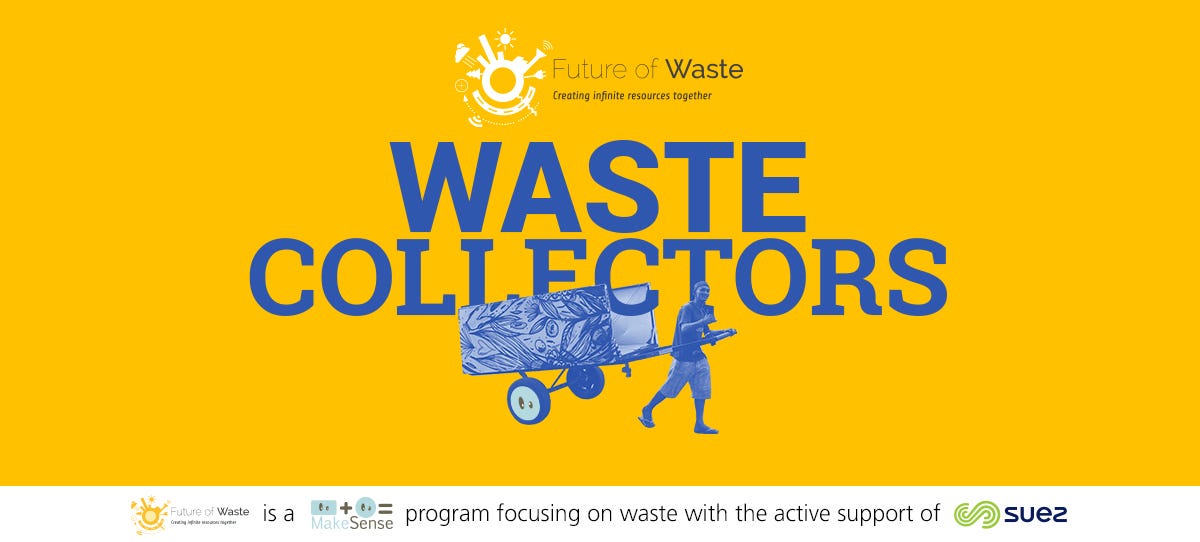
Sustainable development used to be something many people referred to as a way to secure a decent future for their children. They were wrong about the time-lapse: earth resources have been so badly depleted and damaged that major changes will happen in their lifespan, it’s actually already happening today. The growing volume of waste and our incapacity to collect it properly in a tangible example of our increasing ability to endanger ourselves.
The good news is that we have all technical and social solutions to change that. The bad news is that we are far from doing half of what would be necessary to implement the needed behavioral, economic and social changes. Governments will have to play a major role, but local, rapid and lasting changes will require strong civil society mobilization and stronger support for social entrepreneurs and waste pickers.
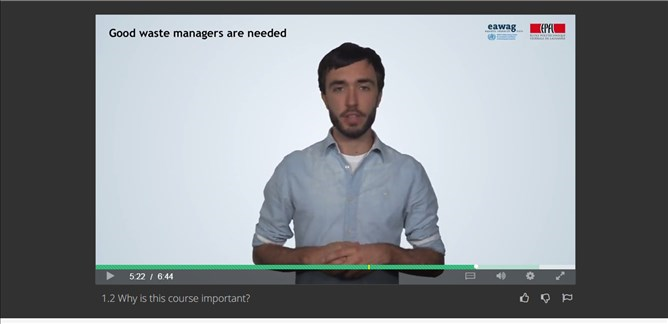
For better understanding, I encourage you to follow this MOOC from which several of the following graphics and fact are taken from
Nothing is waste until you waste it
According to the World Bank, the world generates 1,3 billion tons of urban waste each year. In Albania, and in many developing countries, only half of household waste is being collected. In richer countries, despite the available infrastructures, many urban areas like Paris only display a 30% sorting rate. As a result, 2/3 of what could be considered as resources is wasted and only a tiny percentage can be recycled, which leads to further natural resources depletion. According to Reller & Graedel, there will be no more tin, lead, zinc and copper in around 50 years.
If properly separated and collected, the content of our bins could be an opportunity. Organic waste is a chance to have compost for community gardens like R-Urban in France, grow proteins for animal feedings like Entocycle in Brazil . Plastic waste could provide cheap raw and local material for craftsmen like Zamke in Togoor construction industries like TECO². Easier still, we could give away food, clothes, computer devices or furniture for those who badly need it. Unfortunately, when uncollected or mixed together, valuable resources turns into a plague.
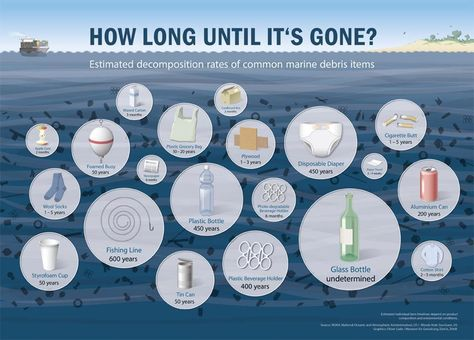
Uncollected Waste kills!
People often fail to mention that there are worst options that landfilling. When non-biodegradable waste is left uncollected in the biosphere, it takes ages to disappear and its artificial chemical component pollutes the ecosystem. The most visible part of this ecological disaster can be illustrated with the formation of a “waste continent” in the Pacific Ocean that kills numerous species eating those floating items.
As a student doing an exchange program in Rio de Janeiro (Brazil), I discovered how uncollected waste directly impacted health condition. The accumulation of mixed waste in areas where public services don’t go generated a proliferation of mosquitos, rats, and bacteria causing city slums to have very high rate of leptospirosis, cholera, dengue, diarrhea and hepatitis. A striking exemple occured in 1994, when uncollected waste blocked the Surat (India) city drains. It resulted in an outbreak of plague which resulted in the death of 56 people and the forced migration of 300.000 people in two days.
Many waste collection problem in La Rocinha (Brazil)
Waste pickers rock!
In rich countries, there are scores of infrastructures and solutions to collect waste. Local governments of San Francisco (US), Capannori (Italy), Halifax (Canada), and Hernani (Spain) developed efficient collecting habits and equipment for all stakeholders. Startups like Lemon tri, Phenix, provide state of the art devices and logistic solution. Many networks or NGOs like compost pedalers, Surfriders, either global or super local organize community mobilizations and trainings to clean the streets, beaches or countryside. Important municipal budget are allocated for waste collection and transport, workers are paid, and volunteers are praised for the highly valuable service they provide.
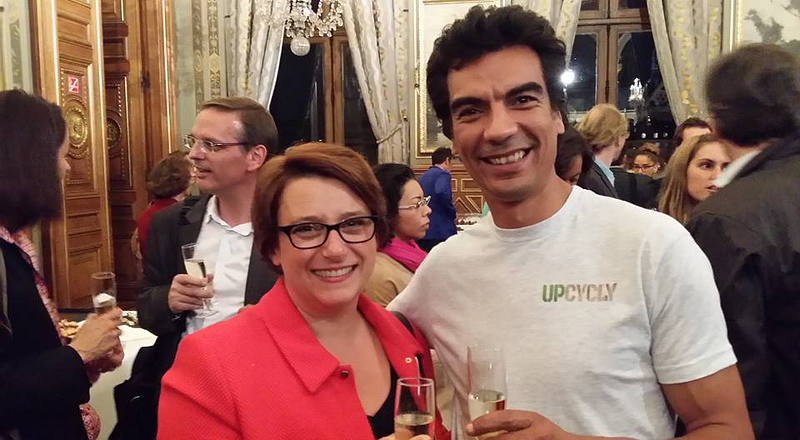
Wassim from Upcycly being prized for its upcycling work at the circular economy trophee in Paris
That is unfortunately not the case for waste pickers. Whether they are called biffins, catadores, pepenedores, freegan, those “informal workers” salvage reusable or recyclable materials thrown away by others mostly to sell it on markets or to recycling industries. Often considered as outcasts and working in dreadful conditions, they collect waste in the streets or in dumpsites and provide society a free but priceless services while cleaning the streets and redirecting valuable resources. Despite their good work in waste collection, their activities are often fought by local authorities in the name of occupational hazards and they suffer stigma and violence. Each March 1st, demonstration are organized to commemorate a slaughter in Colombia during which 11 waste pickers were murdered.
Future of Waste supports anyone dedicated to foster better waste collection, prevention, upcycling and recycling. We encourage you to learn more about waste pickers organizations like Amelior in France, Amazing Waste Project in Albania, GezaJozi in south Africa, Pimp my Carroça no Brazil or ReciVeci in Ecuador and take action to support them.
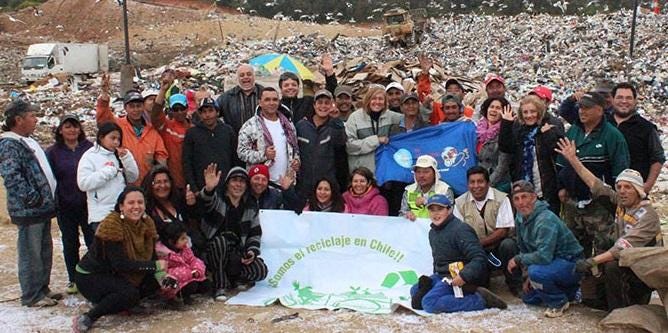
Join the mobilisation
Let’s foster better segregated waste collection together. Like our Facebookpage where we share articles, upcoming events and mobilization campaigns. Everybody’s free to join either just to share moments and learnings or to organize events, workshops after joining this facebook group so that we get to know you better. Don’t be afraid if you’re not a specialist, we need enthusiastic and curious people and we train every volunteer to our open source methodologies to help social entrepreneurs. If you are part of an interesting project about waste collection or know one, please let us know.
Contact me at antoine@makesense.org or meet our local teams or backpackers all around the world, from Mexico City to Beirut, Brussels to Manila, Dakar to Paris and 100 other cities where citizen joyfully do the best they can to take meaningful actions!
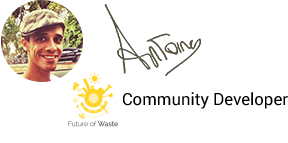
Antoine is coordinating our track called “Future of Waste” supported by our active partner SUEZ. He mobilizes citizens to help social business entrepreneurs building solutions to valorize waste.

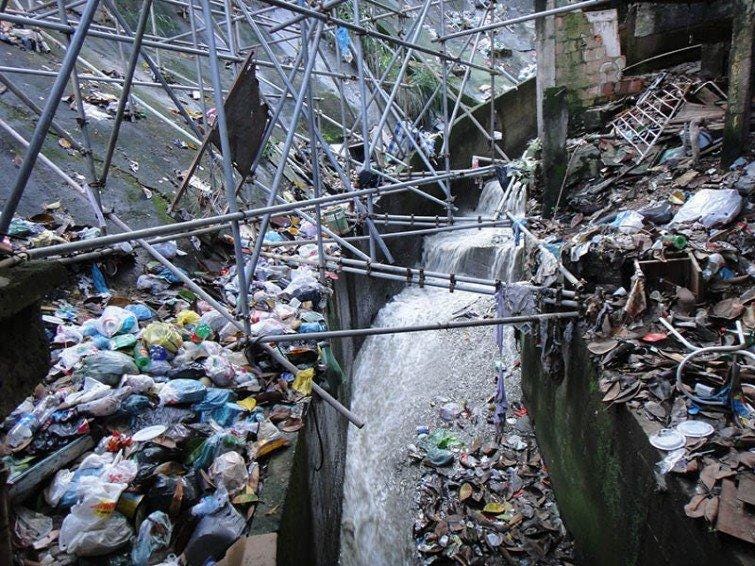
 Entrez votre adresse pour avoir du contenu adapté
Entrez votre adresse pour avoir du contenu adapté

Find us